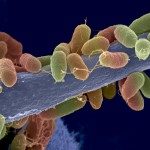Link to Pubmed [PMID] – 18410286
Mol. Microbiol. 2008 Jun;68(5):1283-99
Meiosis is the developmental programme by which sexually reproducing diploid organisms generate haploid gametes. In yeast, meiosis is followed by spore morphogenesis. The formation of the Schizosaccharomyces pombe ascospore wall requires the co-ordinated activity of enzymes involved in the biosynthesis and modification of its components, such as glucans. During sporogenesis, the beta-1,3-glucan synthase bgs2p synthesizes linear beta-1,3-glucans, which remain unorganized and alkali-soluble until covalent linkages are set up between beta-1,3-glucans and other cell wall components. Several proteins belonging to the glycoside hydrolase family 72 (GH72) with beta-1,3-glucanosyltransferase activity have been described in other organisms, such as the Saccharomyces cerevisiae Gas1p or the Aspergillus fumigatus Gel1p. Here we describe the characterization of gas4(+), a new gene that encodes a protein of the GH72 family. Deletion of this gene does not lead to any apparent defect during vegetative growth, but homozygous gas4Delta diploids show a sporulation defect. Although meiosis occurs normally, ascospores are unable to mature or to germinate. The expression of gas4(+) is strongly induced during sporulation and a yellow fluorescent protein (YFP)-gas4p fusion protein localizes to the ascospore periphery during sporulation. We conclude that gas4p is required for ascospore maturation in S. pombe.

